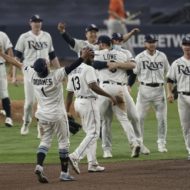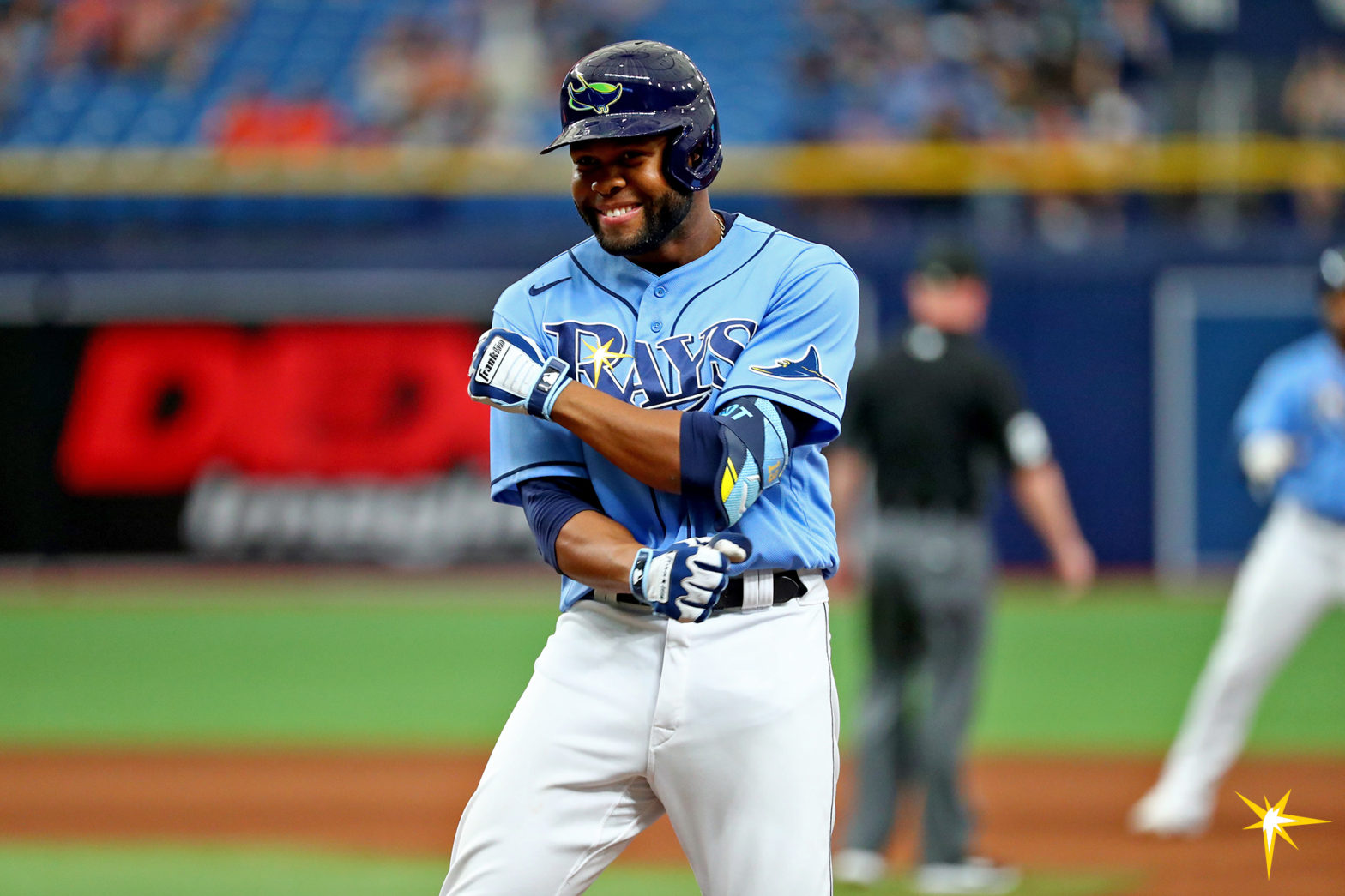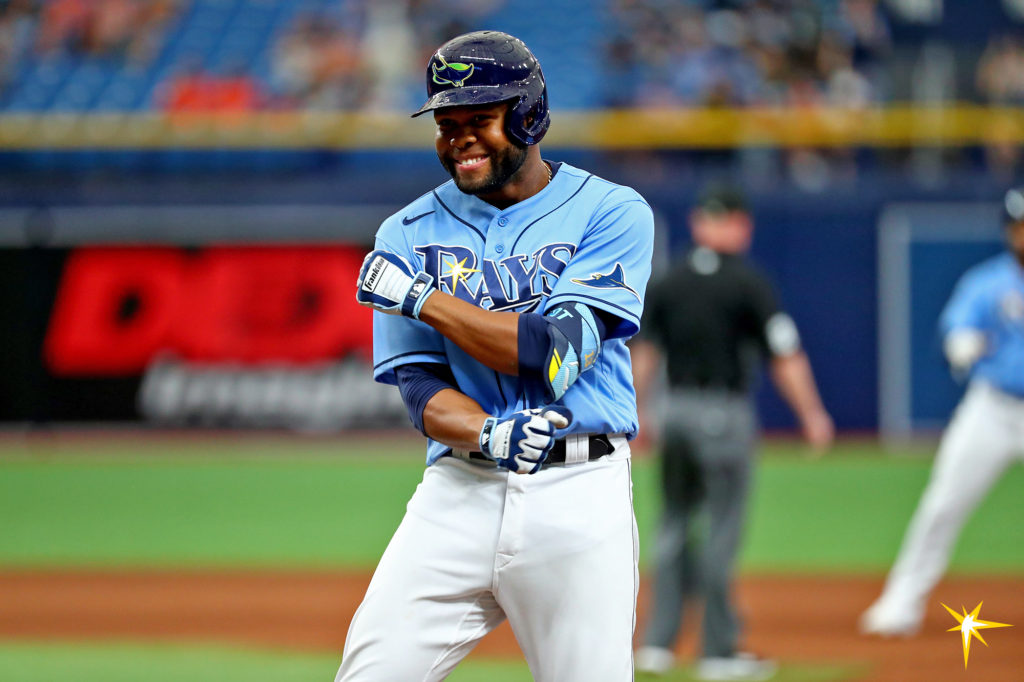
After salvaging a win in the series finale against the Astros on Sunday, the Tampa Bay Rays make their way to Anaheim, where they will start a four-game series against the the Angels Angels, on Monday. The Angels are coming off a series loss of their own, having dropped two-of-three to the Mariners.
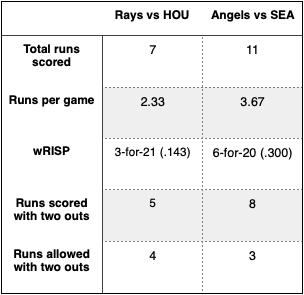
As I wrote on Sunday, much has been said about the Rays wRISP woes, and for good reason — their lack of productivity is primarily the result of struggles with runners in scoring position. Tampa Bay went 3-for-21 in the previous series and 7-for-their-last-71 overall. Sunday marked the first time they scored more than two runs in a five-game stretch. However, this goes deeper than not driving in runners at second and third, as they have had difficulty at the plate, in general, the last week to two weeks. Enter the BABIP luck dragons.
Looking at things in context, over the last seven days, the Rays combined BABIP has hovered around the .211 mark — roughly .012 (give it take) below their season mark, and .089 below last season’s mark. Put another way, they have made contact, but they’ve hit the ball where the fielders were, not where they weren’t. Working in their favor, the Rays were much luckier on Sunday, posting a .316 BABP. One of those luck dragonesque hits proved to be the deciding run when Manuel Margot slapped an opposite-field single through the right side for the late go-ahead lead. It also came with a runner in scoring position. Things will eventually even out; their numbers will eventually change, and the production will increase.
Does the offense need to figure things out? Yes, 100%. But, as I mentioned in the opening series preview, the team is in the midst of the toughest part of the schedule, and things will progressively get easier … especially around July and beyond. In short, they need to hang around where they are in the W/L columns — and ideally get over that .500 hump — until then, and after they should be able to rattle off wins more consistently. By then, too, we should see the promotion of some prospects including a certain number one overall prospect. The pitching has stabilized for the most part, and the BABIP tides will eventually turn.
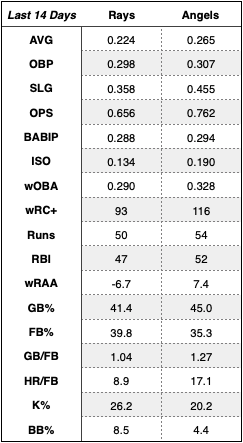
Meanwhile, the Angels have been trending in the opposite direction since their fast start, erasing a 9-6 start by dropping seven of their last 11 games and falling into fourth place in the AL West. Yet in spite of this, the Halos have still outperformed the Rays, offensively, over the last 14 days. It will be up to Tyler Glasnow and Co. to suppress any Los Angeles runs and allow Rays hitters to scratch across some runs of their own as they build on a productive Sunday contest.
Pitching Probables
Over the next four days, Kevin Cash is expected to turn to Tyler Glasnow (3-1, 1.67 ERA), Shane McClanahan (0-0, 4.50 ERA) in some capacity, Ryan Yarbrough (1-3, 4.86 ERA) in some capacity, and Josh Fleming (1-3, 2.18 ERA). Friend of the Rays Joe Maddon will counter with José Quintana (0-2, 10.13 ERA), friend of the Rays Alex Cobb (1-1, 7.16 ERA), Shohei Ohtani (1-0, 3.29 ERA), and Andrew Heaney (1-3, 5.25 ERA).
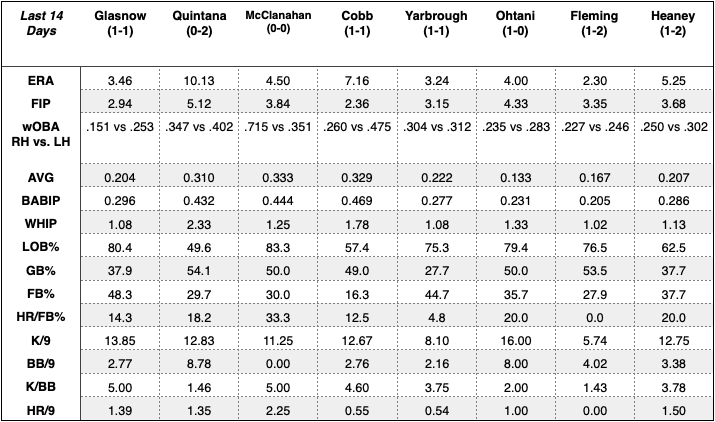
Tyler Glasnow got the start against Oakland and scattered five hits while walking two and striking out 10. It was the second consecutive game with double-digit punchouts for the right-hander, who threw 97 pitches (67 strikes, 69% strike rate) overall. He also threw 22 of 27 first-pitch strikes. Glasnow mixed his pitches effectively, leaning heavily on his high octane heater (51 thrown) and his cut-slider (33 thrown). And while he tossed just eight curveballs, four of them were thrown for strike three.
The only time Glasnow found himself in trouble came two outs in the sixth after he allowed a double to Mitch Moreland against the shift, and a first-pitch single to left off the bat of Matt Chapman — putting runners on the corners. Chapman moved up 90 feet on a wild pitch, yet Glasnow got Seth Brown to weakly ground out to Willy Adames, thus maintaining Tampa Bay’s lead. Glasnow capped his night with a perfect seventh inning. Of the Rays’ four combination shutouts this season, three were started by Tyler Glasnow, who is averaging over six innings per start. He has never faced the Angels.
José Quintana will get the start on Monday in place of Shohei Ohtani (elbow), who was hit by a pitch in Sunday’s loss to the Mariners. Quintana went 3-1/3 innings and allowed five runs, six hits, and two walks with two strikeouts against the Rangers on Tuesday. He served up home runs to Nick Solak in the first inning and Joey Gallo in the third before he allowed three consecutive baserunners in the fourth, which ended his day. Quintana now has failed to complete four innings in three of his four starts with the Angels. Quintana is 1-3 with a 3.05 ERA in seven career starts against the Rays. He relies primarily on a 91 mph four-seam fastball, 79 mph curveball, and an 87 mph changeup. Key Matchups: Kevin Kiermaier (7-14, 2 2B), Manuel Margot (5-10, 2 2B, BB), Brett Phillips (1-2, 2B)
Shane McClanahan allowed two earned runs on five hits and no walks while striking out five across four innings on Thursday against the Athletics. McClanahan flashed plenty of swing-and-miss stuff in his first regular-season big-league start, as he coaxed 15 whiffs on only 59 pitches. He relied equally on his upper 90’s fastball (which hit 101 mph) and his slider.
Alex Cobb allowed three earned runs on six hits and no walks while striking out two across two innings on Wednesday against the Rangers. Cobb couldn’t put hitters away and had several lengthy at-bats, which resulted in him being pulled after just two frames and 51 pitches of not great work. This was his second consecutive start in which he failed to escape the third inning, and he now has a 7.16 ERA across 16-1/3 innings on the season. He has managed a 4.6 K/BB and 2.34 FIP, so some bad luck has factored into things. The former Ray is 0-4 with a 4.32 ERA in six career starts against his former team. Cobb relies primarily on a 92 mph sinker and an 88 mph changeup, while also mixing in an 83 mph knuckle curveball. Key Matchups: Willy Adames (2-6, 2B), Brandon Lowe (2-7, BB), Manuel Margot (1-4, 2B, BB), Yoshi Tsutsugo (2B, 3B, RBI), Joey Wendle (4-11, 2 RBI), Mike Zunino (5-11, 2B, HR, 9 RBI, BB)
Ryan Yarbrough gave up five runs on nine hits and a walk over six innings against the Astros on 103 pitches (71 strikes, 69% strike rate). He struck out five. The lefty wasn’t particularly effective, allowing runs to cross the plate in the first, third, and fourth innings. Yarbrough now has a 4.86 ERA/3.10 FIP and a 4.33 K/BB overall through 33-1/3 innings. However, when he pitches out of the bulk role, his ERA and FIP look much different, dropping to a 0.84 ERA/2.60 FIP and a 3.34 K/BB across 10-2/3 frames. The lesson to be learned here is that, perhaps, Yarbrough should pitch behind an opener. Yarbrough is 2-2 with a 7.25 ERA in four career outings (two starts) against the Angels.
Shohei Ohtani gave up four runs to the Rangers on three hits and a pair of walks while striking out nine across five innings on Monday. At the plate, Ohtani went 2-for-3 with a double, two RBI, a walk, and three runs scored. Ohtani got off to a shaky first inning in his first road start of the year, an outing that was highlighted by a three-run home run by Nate Lowe, a wild pitch, and a sacrifice fly by David Dahl. Ohtani has struggled with command this season, including first-pitch strike percentage that registers under 50% while tallying 13 walks across 13-2/3 innings. The two-way player was able to help his own cause in the second inning when he hit a two-run double and eventually scored a game-tying run. Ohtani was able to regain his confidence on the bump, shutting the Rangers out the rest of the way. He has never faced the Rays in a pitching capacity. Ohtani relies primarily on a 97 mph four-seam fastball that will touch 100, and an 81 mph slider, while also mixing in an 87 mph cutter, and a 75 mph curveball.
Josh Fleming gave up three runs on three hits and five walks over six innings while striking out four on Saturday. The left-hander had walked only four batters in 14-2/3 innings entering his start, yet Fleming had trouble finding the plate Saturday and tossed just 59 of 98 pitches for strikes (60% strike rate). In spite of the inefficiency though, he did record his first quality start in four turns. Fleming has a 2.18 ERA and 1.33 K/BB through 20-2/3 innings on the season.
Andrew Heaney allowed four runs on six hits and two walks while striking out five across 3-1/3 innings on Friday against the Mariners. Heaney came into the contest riding a strong three-game stretch during which he allowed only three earned runs over 17-2/3 frames. But, Seattle put an end to the string of excellent starts, swatting three homers off the right-hander and tagging him for four runs. Heaney needed 90 pitches to record 10 outs and left following a Tom Murphy homer with one out in the fourth inning. He now maintains a 5.25 ERA although he has posted an excellent 3.78 K/BB across 24 innings. Heaney is 0-3 with a 4.87 ERA in three career starts against the Rays. He relies primarily on a 92 mph four-seam fastball, an 80 mph curveball, and an 84 mph changeup. Key Matchups: Willy Adames (2-6, HR, 2 RBI), Austin Meadows (3-5, 2B, HR, 2 RBI), Joey Wendle (1-2)
Noteworthiness
— Collin McHugh (lower back strain) threw a multi-inning simulated game on Sunday as he works his way back from injury. Pete Fairbanks (rotator cuff strain) is to throw a second and possibly final simulated game on Monday. McHugh and Fairbanks are with the team and both could be activated during the current road trip.
